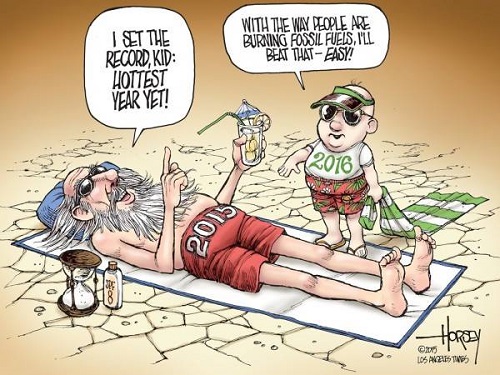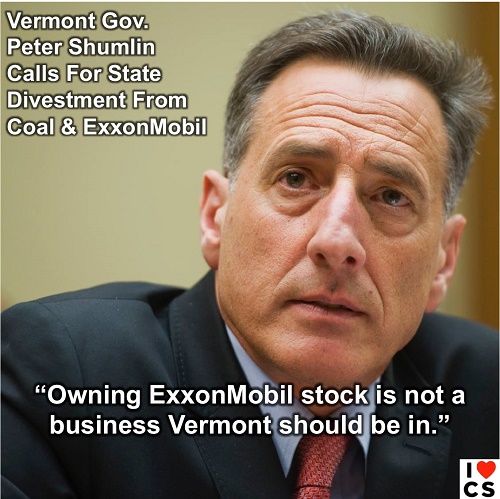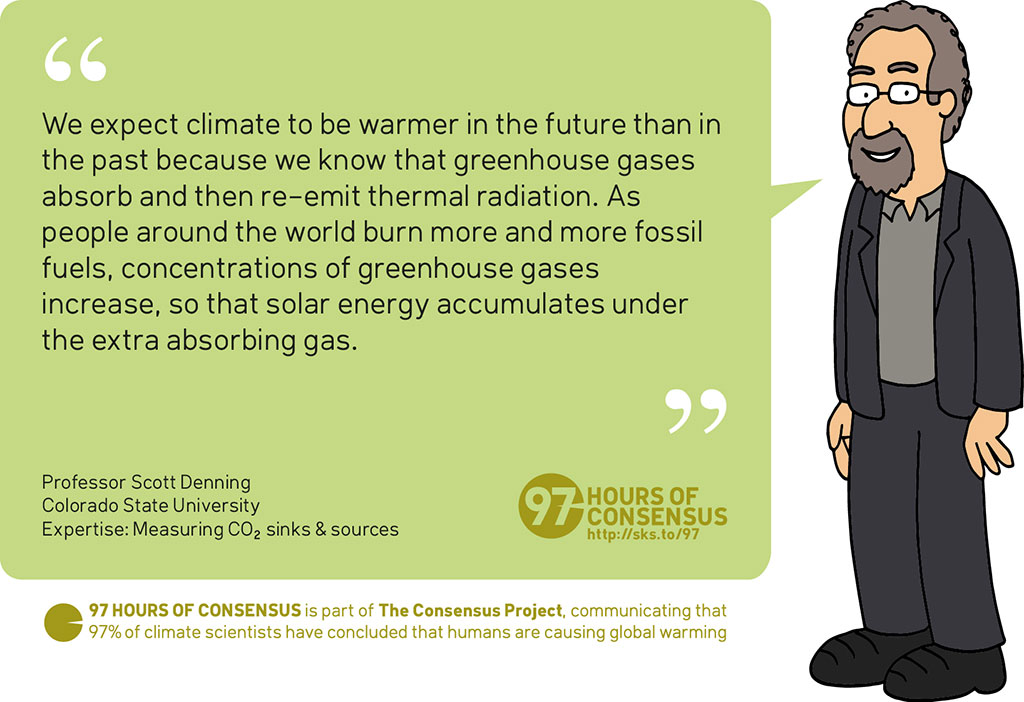2016 SkS Weekly Digest #2
Posted on 10 January 2016 by John Hartz
SkS Highlights... El Niño Impacts... Toon of the Week... Quote of the Week... He Said What?... SkS in the News... SkS Spotlights... Coming Soon on SkS... Poster of the Week... SkS Week in Review... 97 Hours of Consensus...
SkS Highlights
Why is the largest Earth science conference still sponsored by Exxon? by Ploy Achakulwisut, Ben Scandella & Britta Voss (Climate Consensus - the 97%, The Guardian) generated the highest number of comments of the articles posted on SkS during the past week.
Latest data shows cooling Sun, warming Earth by Mark R and 95% consensus of expert economists: cut carbon pollution by Dana Nuccitelli (Climate Consensus - the 97%, The Guardian) each attracted the second highest number of comments.
El Niño Impacts
Briefing United Nations Member States today on the widely varied and devastating impacts of the current El Niño weather phenomenon – which for months has sparked massive floods in some countries while leaving others, often in the same region, bone dry – the top UN relief official urged the international community to act now to help millions of people facing food insecurity.
“We are here to re-sound the alarm; to spur a collective response to the humanitarian suffering caused by changes in weather patterns linked to El Niño and to take action now to mitigate its effects,” said Stephen O'Brien, the UN Under-Secretary-General for the Coordination of Humanitarian Affairs, who added: “If we act now, we will save lives and livelihoods and prevent an even more serious humanitarian emergency from taking hold.”
He said that in some regions, millions of people are already facing food insecurity caused by droughts related to El Niño. “In other parts of the world, we have a short window of opportunity now to prepare for what we know will happen within months. In both cases, we must act together and we must act quickly,” he stressed.
El Niño has put world in 'uncharted territory,' UN relief chief says, urging action now to mitigate impacts, UN News Centre, Jan 7, 2016
Toon of the Week

Hat tip to I Heart Climate Scientists
Source: Ragged old year brought hope on climate change and same-sex marriage by David Hoarsey, Los Angeles Times, Dec 31, 2015
Quote of the Week
"We often use the geological record to help us test or expand our understanding of climate change, for example, determining the sensitivity of Earth’s temperature to higher CO2 levels," Pancost* said.
"But testing the risks associated with the pace of modern environmental change is proving problematic, due to a lack of similar rapid changes in the geological past. Consequently, these risks, in this case to the marine ecosystems on which so many of us depend, remain associated with profound uncertainty," he added. "Decreasing CO2 emissions, as recently agreed in Paris, will be necessary to avoid these risks."
*Professor Rich Pancost, Director of Bristol University’s Cabot Institute
Environmental Change Rate Unprecedented, Study Says by James Crugnale, The Weather Channel, Jan 7, 2016
He Said What?
When asked by Annika Barth, a New Hampshire resident and freshman at American University, if he would support a Department of Justice (DOJ) investigation on all that Exxon knew about climate change, Republican presidential candidate Marco Rubio referred to the investigation as “nothing but a left-wing effort to demonize industries in America.”
Marco Rubio Calls Exxon Scandal ‘Nothing But a Left-Wing Effort to Demonize Industry’, EcoWatch Jan 8, 2016
SkS in the News
Dr. Jeff Masters plugs SkS starting at 25:00:
[...] We partnered with a group called SkepticalScience.com. They are a very excellent volunteer organisation that's gone through and collected a lot of the myths about climate change. You know the "it's not happening", "that the globe is cooling" and so on and so forth. And they've analysed all those myths and given responses to each of them. So, they've come up with a really excellent sort of social media presence to go and get at the nitty gritty of you know scientists think, what the naysayers say, and how the two can be reconciled, if indeed they can be.[...]
HashtagVOA: #NorthPole #ElNino #Storm Frank, Voice of America (VOA), Jan 6, 2016
SkS Spotlights
The Cabot Institute, the University of Bristol’s first flagship cross-disciplinary research institute, conducts world-leading research on the challenges arising from how we live with, depend on and affect our planet. It is rooted in a recognition of social and environmental challenges but inspired by the spirit of exploration personified by John Cabot (Zuan Caboto) and the City of Bristol.
The institute main themes focus on the six major issues at the centre of the human-planetary relationship:
- global environmental change,
- food,
- water,
- energy security,
- natural hazards, and
- future cities and communities.
Coming Soon on SkS
- Surface Temperature or Satellite Brightness? (Kevin C)
- NASA study fixes error in low contrarian climate sensitivity estimates (Gavin)
- The Quest for CCS (Andy S)
- Guest Post (John Abraham)
- If Done Correctly, Refuting Climate Myths can be an Effective Educational Strategy (Scott Mandia)
- 2016 SkS Weekly News Roundup #3 (John Hartz)
- 2016 SkS Weekly Digest #3 (John Hartz)
Poster of the Week

SkS Week in Review
- 2016 SkS Weekly News Roundup #2 by John Hartz
- AGU’s Sharing Science is helping scientists talk to the rest of us by John Abraham (Climate Consensus - the 97%, The Guardian)
- Carbon Brief’s 15 numbers for 2015 by Carbon Brief staff (Carbon Brief)
- Why is the largest Earth science conference still sponsored by Exxon? by Ploy Achakulwisut, Ben Scandella & Britta Voss (Climate Consensus - the 97%, The Guardian)
- Latest data shows cooling Sun, warming Earth by Mark R
- 95% consensus of expert economists: cut carbon pollution by Dana Nuccitelli (Climate Consensus - the 97%, The Guardian)
- 2016 SkS Weekly Digest #1 by John Hartz
97 Hours of Consensus: Scott Dening

Quote derived with author's permission from:
"But our expectations of future warming are not based on extrapolation of recent trends. Rather, we expect climate to be warmer in the future than in the past because we know that greenhouse gases absorb and then re-emit thermal radiation. As people around the world burn more and more fossil fuels, concentrations of greenhouse gases increase, so that solar energy accumulates under the extra absorbing gas. Scientists expect accumulating heat to cause warming temperatures because we know that when we add heat to things, they change their temperatures."































 Arguments
Arguments






























Comments